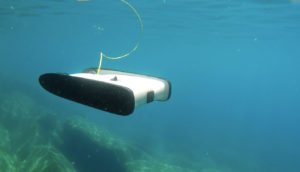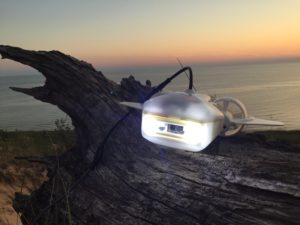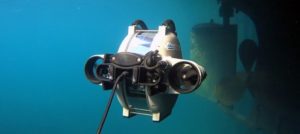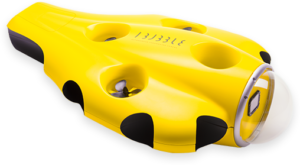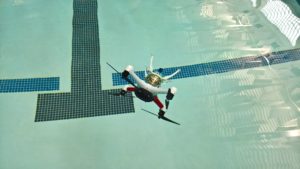Drones are coming to a sea near you. After the last few years’ advances in underwater digital imaging and videography, the next big thing is likely to be remote-controlled underwater drones.
The technology is already there, with professional salvagers and underwater explorers using remotely-operated robots for some time now. But the technology has thus far been prohibitively expensive, and has required quite a lot of skill and training to operate. But prices have dropped with this new generation of consumer drones, and usability is quite high. So take your pick — we’re counting down five of the best underwater drones.
 OpenROV Trident
OpenROV Trident
This drone is the layman’s version of a professional ROV, communications tether and all. But where professional ROVs can run up to $20,000, this one comes in between $1499 and $2000. Users control the unit topside using a smartphone or tablet. A built-in HD camera and up to 330 feet (100 m) of tether allow you to capture high-def video at depth. Shipping starts later this year; pre-orders are open now.
Maximum depth: Up to 330 feet (100 m), depending on tether
Autonomous: No
Camera: Onboard 1080 HD
Price: $1499 and up
Available: Pre-order available; launch expected mid-2017
More information here
 Fathom ONE
Fathom ONE
Closely related to the Trident is the Fathom ONE. This one also utilizes a tether and wireless controls using Android or iOS devices. The price tag is lower, though, with the Fathom ONE having a retail price of only $600. The drone does have a depth-limit of 150 feet, however. The drone has backing through Kickstarter, but you can pre-order one on their website, with delivery expected in July 2017.
Maximum depth: Up to 150 feet (46 m)
Autonomous: No
Camera: Onboard 1080 HD
Price: $599
Available: Kickstarter campaign running; pre-order available; launch expected July 2017
More information here
 Deep Trekker DTG2
Deep Trekker DTG2
Another consumer drone that emulates a professional one, the DTG2 claims to be one of the easiest to maneuver. It also boasts up to eight hours of battery life (compared to one hour for the Fathom ONE). The DTG2 is part of a product line, so you can pick the one that suits your needs. The basic model, called the DTG2 Starter, will take you to 165 feet (50 m) with its tether and features a 700 ppi camera. The advanced model, the DTG2 Smart, sports a 246-foot tether (75 m) and features such as depth and pitch sensors. Prices are steep, though — up to $10,000 for the Smart drone.
Maximum depth: Up to 490 feet (150 m) depth rating for the DTG2 Smart
Autonomous: No
Camera: Onboard 700 HD
Price: From $3,899 to $10,000
Available: Now
More information here
 iBubble
iBubble
The first truly autonomous of the underwater drones on the list, the iBubble is the first one developed specifically for scuba divers. About the size of a lifeguard’s flotation device, the iBubble will quite literally follow you around like a dog on your dive, recording not just the dive site, but also you and your buddies as well. The operator wears a bracelet so the iBubble knows who to follow. You can also use the bracelet to call the drone to you if you want to use it as a camera, or if you need to surface. The drone can move up to 80 feet (25 m) away from divers.
An optional tether is available for surface-based real-time video. Interchangeable, rechargeable batteries (rather than permanently built-in ones) mean you can use the drone on repetitive dives; each battery lasts about an hour. The company behind the iBubble is currently running an Indiegogo campaign.
Maximum depth: Up to 197 feet (60 m)
Autonomous: Yes
Camera: No, but GoPro compatible
Price: $2,599 retail; $1,999 on Indiegogo
Available: Expected May 2018
More information here
 Loon Copter
Loon Copter
A team from Oakland University in California developed the Loon Copter, by far the most futuristic of this group of underwater drones. It’s the Navy SEAL (SEa, Air, Land) of drones: an aerial drone capable of diving and swimming. The design closely resembles a traditional airborne drone, with four propellers giving it lift and helping it take off, fly and hover. But submerse it in water, and something crazy happens: it turns on its side and uses the propellers to start maneuvering underwater. The Loon Copter is the one-stop-shop drone that allows you to capture above-water footage of hikes or boat trips and then transition, within a single film, to underwater footage.
It is untethered, but does need a pilot. This does limit range, particularly underwater. The third version of the prototype won the Drones for Good exhibition in Dubai in 2016, but there’s no news yet of when, or if, there will be a commercially available version.
Maximum depth: Unknown
Autonomous: No, but untethered
Camera: Yes, but specs are unknown
Price: Unknown
Available: Unknown
More information here


